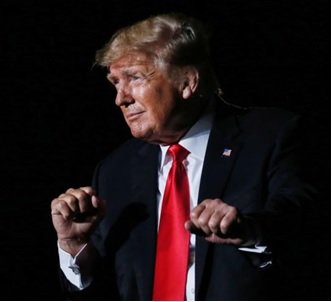By Faisal A. Roble
The re-election of Donald J. Trump represented a political Tsunami and no less than a national mandate. January 2025 comes, Mr. Trump will have a long list of priorities whose implementations are not a small feat.

His GOP party, winning the three branches of the government, Mr. Trump would have a rare chance to implement election promises. Some of these include pulling the US out of the Paris Agreement on climate change, producing more fossil fuel including by fracking. In foreign policy, he is expected to pursue hawkish foreign policy towards China and Iran. He may also jumpstart the sleeping Abraham Accords which could center Israel in the Middle East’s affairs. The beneficiaries of such an approach could be Israel, Egypt, the Kingdom of Saudi Arabia, Qatar, and possibly the United Arab Emirates.
First test comes with the alien deportation issue. How and when to deport the more than 11 million undocumented aliens would require a Herculean effort for the incoming Whitehouse. Also, imposing tariffs, as much as 60 percent, on goods imported from China will certainly pose a challenge. If pursued, however, this policy tariffs will have a ripple effect on America’s angry middle and working class who frequent popular stores such as Walmart.
The promise of bringing back factory jobs, a campaign issue that attracted the largely discontented White working class, could prove a lot more difficult than meets the eye.

Since Ronald Regean’s administration, the US religiously followed a neoclassical economic model which resulted in deindustrializing America. Mr. Trump in his successful election campaign effectively exploited the plight of the working class. Now that electioneering is done, Whether the Trump administration would reverse America’s entrenched deindustrialization and bring back manufacturing jobs remains to be seen.
America’s rust belt lost its manufacturing base back in the 1980s. In 1984, Barry Bluestone and Benet Harrison of MIT authoritatively argued in their book “The Deindustrialization of America: Plant Closings, Community Abandonment, and the Dismantling of Basic Industries” America lost its well-paying manufacturing jobs in favor of jobs that require low-skilled labors.
The subsequent North American Free Trade Agreement (NAFTA) signed by Bill Clinton eased the process of America’s corporate greed and its insatiable appetite for profit maximization by locating factories outside the US. Mr. Trump is expected to quickly show improvements in the lives of people in Ohio, Wisconsin, Pennsylvania. Can President Trump restore them as soon as possible? If not he will be subject to an equal wrath as the Democrats did.
Africa and Trump
President Trump’s isolationist policy may not bode for Africa except a handful of countries that may command his attention – probably Nigeria and Egypt. Once Egypt is mentioned, the name of Ethiopia pops up.
In this regard, two policy issues may interest Ethio-American relations watchers – economic/humanitarian assistance and the Grand Ethiopian Renaissance Dam (GERD). While the first issue could be influenced by Donald Trump’s isolationist view of his administration, the second issue could be located within a renewed Trumpian geopolitical approach to the Middle East and Africa.
The first Trump administration sought to cut foreign aid to Ethiopia. It is plausible that the same policy will be pursued. Americans who probelled the Republicans into office would find it difficult, if not unforgivable, to write checks in the billions of dollars to assist a far-flung country like Ethiopia with no significant transactional return to Trump and his agenda. If any economic engagement between the two is expected, Trump would want to see a streamlined and improved investment environment in Ethiopia. And that is not possible due to the ongoing civil war, the country’s slow and cumbersome rules for investment, and Addis Ababa’s close affiliation with China’s foreign investment. Much economic engagement with Addis Ababa may not be expected in Trump’s era.
The most consequential policy change that could negatively impact Ethiopia could be Trump’s view on the GERD. In his previous term, Trump firmly stood with Egypt’s Al-sisi. First, Trump does not understand why Ethiopia would not negotiate with Egypt whose very existence as a nation depends on the water provided by the Nile; this strikes him as a simple and rational thing to do for a man who has always negotiated.
Also, Trump will favor Egypt because of the peace accord it so long maintained with Israel. Because of these two factors, Trump would most likely pressure Ethiopia to negotiate with Egypt on the GERD. Ethiopia may not find any see any alternative to Trump’s advice for the alternative could be worse in that he could foreseeably side with Egypt as he did in his previous administration.
Somalia also deserves a particular and unique attention. Despite that Mogadishu has a close relationship with two key partners of Washington, i.e., Egypt, and Turkey, the Trump administration may constructively engage Somalia. There is a lot of speculation that the military assistant provided to Somalia may experience a reduction. However such a move may not advance US policy which seeks to limit the expansion of Issis and Al Qaeda.
Another area to watch is how the Trump administration would utilize Somalia in challenging China given Somalia’s location vis-vis the China envisioned Road and Belt.
Lastly, Africom, whose headquarters is located in Djibouti, could, could, be downsized as part of Mr. Trump’s commitment to reduce his military budget. But that could pose a challenge to his stated goals to combat Chinese influence in the Horn of Africa.
All these largely may depend on who assumes the offices of Secretaries of Defense and State. In the final analysis, the Horn of Africa may not make Mr. Trump’s top priorities, although Egypt may emerge as the new guardian of the Red Sea.
Faisal A. Roble
Email: faisalroble19@gmail.com
———-
Faisal Roble, the former editor of WardheerNews portal is Principal City Planner and CEO for Racial Justice & Equity for the Planning Department, Los Angeles City.

Leave a Reply